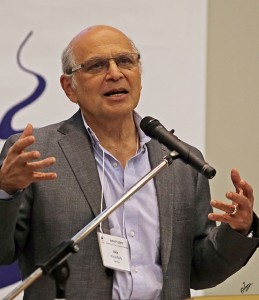 Last weekend I attended the Parkland Conference where I listened to the keynote speaker, Alex Himelfarb, explain the three laws of Austerity:
Last weekend I attended the Parkland Conference where I listened to the keynote speaker, Alex Himelfarb, explain the three laws of Austerity:
- Austerity is toxic.
- Austerity limits our view of what is possible.
- Austerity is not inevitable, it is the result of a theory. We created this theory. We can change it.
Then, later in his speech, while discussing the value of taxes, he offered, and attempted to refute, a quote he often hears from business leaders:
“I’m happy to pay taxes, as soon as we get rid of the waste in government.”
This quote, although Alex was not aware, arises from a fundamental misunderstanding about the health and healthiness of waste and inefficiencies.
Functioning systems, whether we consider them ‘alive’ or not, cannot function at optimal efficiency, cannot function without inefficiencies, cannot function without producing waste. Why? Because functioning systems leverage inefficiencies and waste, even in their own internal environments, to move forward in life. That’s how they maintain their existence.
If any part of a functional system, be it a machine, a living being, a business, or a government, even an economy, succeeds in operating at optimal efficiency – it can cause blockage and backup that leads to system failure. Functioning systems cannot operate with perfect efficiency. No part of a functional system can operate for long with perfect efficiency, because to do so would require every other part to function with perfect efficiency, or to fail.
Functional systems actually survive and thrive, on waste and inefficiency. Inefficiency is required for any system, and for any sub-system to operate.
Functioning systems, and life forms, survive and move forward by taking advantage of imbalances and inefficiencies in their environment, even in their internal environments. We walk, not by balancing perfectly, but by falling forward, and then recovering in a new place. Walking is not terribly efficient, compared to a bicycle – but we haven’t yet evolved wheels, nor brakes. We get the right balance of nutrients, not by finding the perfect food, but by eating a lot of different foods, even foods with unhealthy components, and letting our digestive system sort things out, and excrete what is not required, as waste.
Life, and other systems, – even government and economic systems – operate and produce advantage through effective use of inefficiencies, effective production of waste.
Businesses too. One of the most common uses of inefficiencies in business is the effective use of ‘waste of time’. Your local hamburger takeout counter, operates most efficiently when customers wait in line. Waiting even helps the customers appetite, helps them to enjoy the food. This use of inefficiency is commonplace. Banks, cashiers, and even the post office, operate more efficiently by making customers wait. To be successful, they must balance this efficiency, with their clients’ perception of inefficiency.
Attempts to ‘remove all inefficiency’ will put the system ‘out of business’. Business and government departments exists to take advantage of inefficiencies, and to provide those advantages to clients, shareholders, and the public.
Companies take advantage of inefficiencies to provide benefits for their owners and shareholders, through profits. In many cases, they do this while providing benefit to the public, but sometimes – that’s not always the easiest path to wealth. Wealth can sometimes be produced more easily by taking advantages of inefficiencies while pretending to provide benefit, or by providing advantage to a small group, while creating disadvantages to a large group.
Most businesses are communities, not individuals. They work on the inefficiencies between individual behaviors and abilities, accomplishing things that individuals find impossible. They often do it by wasting more time than any individual can waste, and by creating many more inefficiencies than any individual could manage. Call Centers: spend most of their time in wasteful and inefficient behavior, wasting our time. But somehow they survive and profit. Some people might even argue that they provide benefits to society.
Governments, labour unions, and even churches, also make use of inabilities and inefficiencies of individuals via communities, providing benefits to members of the community. They fund this using through taxes, dues, and donations, instead of profits.
Expecting any system, business or government, to be perfectly efficient, is a simple misunderstanding of realty.
All systems, and all living things, also produce waste. We eat, and we excrete. Businesses and governments do so as well. Consumption and the production of waste is a natural consequence of life, and of functioning systems.
There is only one system that does not produce any waste. Mother nature. Whatever waste she produces, is food for another system.
It is important to examine and monitor all of our systems, our organizations, our companies and our governments to reduce waste and inefficiency. And also for negative behaviors. Sometimes individuals and organizations, inside and outside of government, take advantage of these systems for personal or individual benefit.
An important difference between the use of profit, and the use of taxes, dues, and donations, to take advantage of inefficiencies and provide benefit to society – is that taxes are visible, or can be made visible, while profit is generally invisible. It’s more difficult to take unfair or illegal advantage of tax dollars than it is to use profit.
The more transparent our government – the more difficult it becomes to cheat the public. But making governments transparent can also make normal, natural, necessary inefficiencies and waste visible, giving an overall impression of ineptness. Businesses avoid this with secrecy. But this too has a disadvantage. Too much secrecy makes cheating easier. Neither alternative is a perfect solution. We need both for a healthy society to maximize benefit to and provide equality of rights for all.
It is nonsense, a misunderstanding of how systems work, to believe that we should aim to rid any system of all waste and inefficiency. When we reduce waste and inefficiency to zero the system dies.
Our goal should be to understand waste and inefficiency more clearly, and to use them more effectively to move ourselves, our communities, our businesses, our governments, our economies and our countries forward, towards a better world.
to your health, tracy


